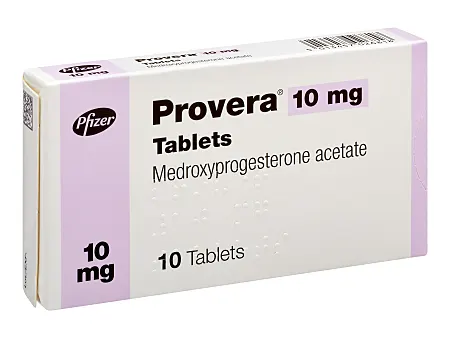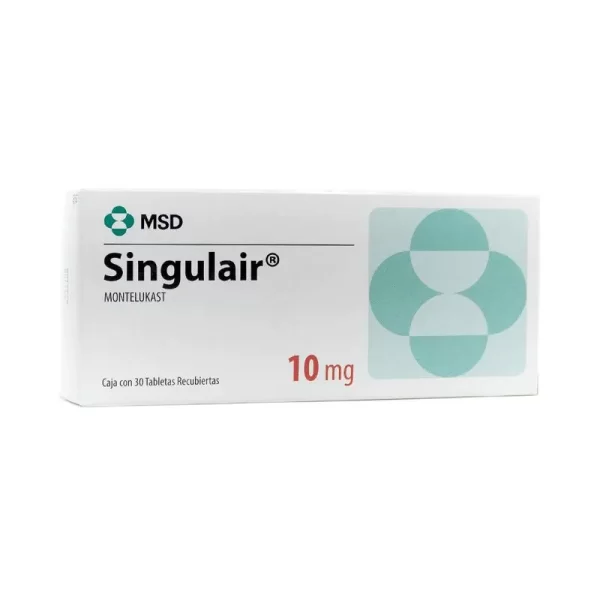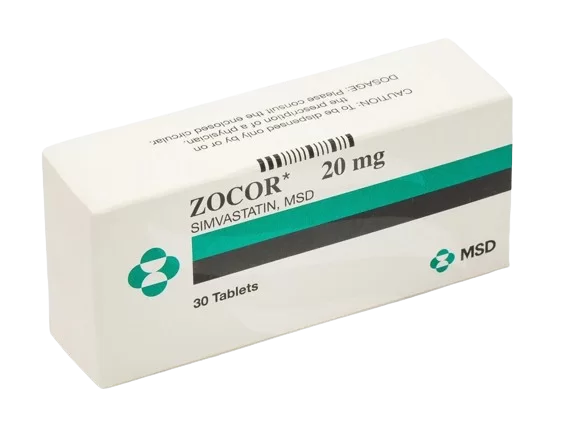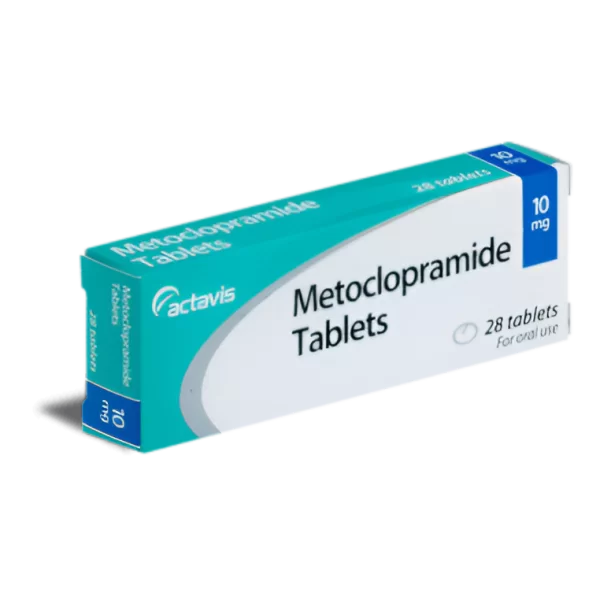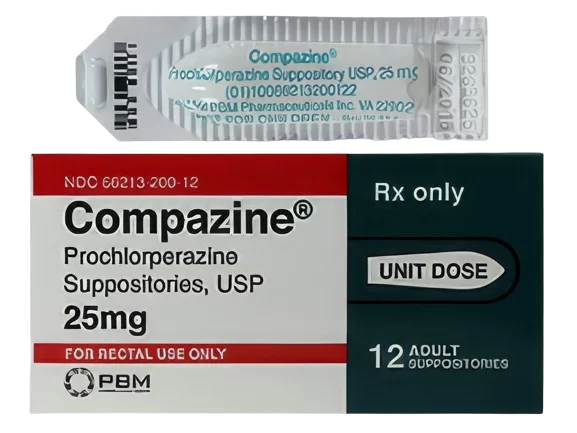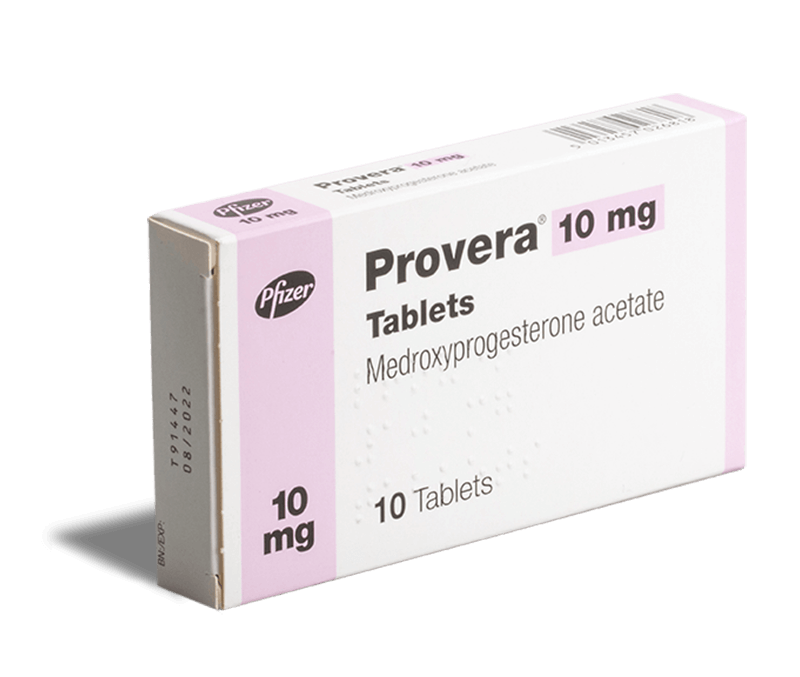
Provera
Provera - 10mg
| Product | Per Pill | Savings | Per Pack | Order |
|---|---|---|---|---|
| 30 pills | $1.13 | $33.80 | Buy Now | |
| 60 pills | $0.92 | $12.54 | $67.60 $55.06 | Buy Now |
| 90 pills | $0.85 | $25.07 | $101.39 $76.32 | Buy Now |
| 120 pills | $0.81 | $37.60 | $135.18 $97.58 | Buy Now |
| 180 pills | $0.78 | $62.67 | $202.77 $140.10 | Buy Now |
| 270 pills | $0.76 | $100.28 | $304.16 $203.88 | Buy Now |
| 360 pills | $0.74 | $137.88 | $405.54 $267.66 | Buy Now |
Overview of Provera
General Introduction to Provera
Provera (medroxyprogesterone acetate) is a synthetic hormone that mimics natural progesterone. It is used to treat various hormonal imbalances, such as irregular menstrual cycles, abnormal uterine bleeding, and preventing the overgrowth of the uterine lining in postmenopausal women on estrogen therapy. Additionally, Provera manages endometriosis and is often included in hormone replacement therapy (HRT). Since its FDA approval in 1959, Provera has been a staple in gynecological treatment due to its efficacy and safety. Available in dosages of 2.5 mg, 5 mg, and 10 mg tablets, Provera allows healthcare providers to tailor treatments to individual needs.
Key Benefits and Unique Properties
Provera offers several advantages for managing hormonal imbalances. It helps regulate menstrual cycles, reduce abnormal uterine bleeding, and prevent endometrial hyperplasia in postmenopausal women on estrogen therapy. Provera's unique mechanism of action includes mimicking natural progesterone, stabilizing the endometrial lining, and alleviating pain and bleeding in endometriosis patients. The medication's versatility in dosage forms allows for tailored treatment, improving patient compliance and outcomes.
Effectiveness
Clinical studies have demonstrated Provera's effectiveness in managing hormonal imbalances. It significantly reduces abnormal uterine bleeding, regulates menstrual cycles, and prevents endometrial hyperplasia in postmenopausal women on estrogen therapy. Provera has a favorable safety profile and is well-tolerated by most patients. Compared to other progesterone and progestin medications, Provera shows high efficacy and fewer side effects, making it a reliable treatment option.
Safety and Tolerability
Provera is generally well-tolerated, but it can cause side effects. Common side effects include nausea, breast tenderness, headache, dizziness, and bloating. Serious but rare side effects include blood clots, vision changes, severe headaches, and jaundice. Regular follow-ups with a healthcare provider are essential to monitor and manage any adverse effects.
Indications for Use
Conditions Treated
Provera is indicated for:
- Secondary Amenorrhea: Induces menstrual cycles in women with hormonal imbalances.
- Abnormal Uterine Bleeding: Stabilizes the endometrial lining to manage bleeding.
- Endometrial Hyperplasia Prevention: Prevents uterine lining overgrowth in postmenopausal women on estrogen therapy.
- Endometriosis: Alleviates pain and irregular bleeding.
- Hormone Replacement Therapy (HRT): Combined with estrogen to reduce the risk of endometrial hyperplasia and maintain hormonal balance.
Symptoms Indicating Use
Provera helps manage symptoms like irregular menstrual cycles, abnormal uterine bleeding, and endometrial hyperplasia prevention in postmenopausal women. It also alleviates pain and bleeding in endometriosis patients and maintains hormonal balance during menopause when used as part of HRT.
Dosage and Administration
Recommended Dosage for Adults
- Secondary Amenorrhea: 5-10 mg daily for 5-10 days, repeated monthly.
- Abnormal Uterine Bleeding: 5-10 mg daily for 5-10 days, starting on day 16 or 21 of the menstrual cycle.
- Endometrial Hyperplasia Prevention: 5-10 mg daily for 12-14 consecutive days each month.
- Endometriosis: 10 mg three times daily for 90 consecutive days.
Administration Guidelines
Take Provera at the same time each day, with or without food. Swallow the tablet whole with water. If a dose is missed, take it as soon as remembered unless it is close to the next dose. Do not double up on doses.
Mechanism of Action
Description of Mechanism
Provera mimics natural progesterone, binding to progesterone receptors in the uterus. This inhibits endometrial lining growth and promotes shedding, regulating menstrual cycles and reducing abnormal bleeding. On a molecular level, Provera affects progesterone receptors in the endometrium, altering gene expression and reducing cell proliferation, maintaining hormonal balance.
Composition
Active Ingredient
Medroxyprogesterone acetate.
Inactive Ingredients
Lactose, corn starch, sucrose, talc, calcium stearate, mineral oil, and FD&C Yellow No. 6. These components contribute to the medication's stability, absorption, and effectiveness.
Side Effects
Common Side Effects
Nausea, breast tenderness, headache, dizziness, and bloating. These side effects are generally mild and tend to diminish with continued use.
Serious Side Effects
Blood clots, vision changes, severe headaches, and jaundice. Patients should seek immediate medical attention if these symptoms occur.
Prevention of Side Effects
General Measures
Follow the prescribed dosage closely and maintain regular monitoring by a healthcare provider. Taking Provera with food can reduce gastrointestinal side effects. A healthy lifestyle, including a balanced diet and regular exercise, can help manage potential side effects.
Contraindications
Do Not Use Provera If You Have
- Pregnancy
- History of blood clots
- Severe liver disease
- Known or suspected breast cancer
- Hypersensitivity to medroxyprogesterone acetate or any of the inactive ingredients
Warnings and Precautions
Use with Caution If You Have
- Depression: Monitor closely for worsening symptoms.
- Diabetes: Regularly monitor blood sugar levels as Provera may affect glucose tolerance.
Missed Dose
If You Miss a Dose
Take it as soon as remembered unless it is almost time for the next dose. Do not double up on doses.
Tips for Adherence
Use a medication reminder app or a pill organizer to help remember to take your medication at the same time each day.
Drug Interactions
Medications That May Interact with Provera
- Rifampin
- Phenytoin
- Carbamazepine
- Warfarin
- Cyclosporine
Recommendations
Inform your healthcare provider about all medications you are taking. Do not start or stop any medications without consulting your healthcare provider. Regular monitoring and adjustments to your treatment plan may be necessary to manage potential drug interactions.
Overdose
Symptoms of Overdose
Symptoms may include nausea, vomiting, dizziness, breast tenderness, and vaginal bleeding. Severe symptoms can include respiratory depression and anaphylactic reactions.
Immediate Measures
Seek emergency medical attention immediately if an overdose is suspected. Supportive care and symptomatic treatment will be provided as needed.
Pharmacokinetics
Absorption
Provera is well-absorbed after oral administration, with peak plasma concentrations reached within 2-4 hours. Food does not significantly affect absorption.
Distribution
Provera is widely distributed throughout the body, with high concentrations in the liver, kidneys, and adrenal glands. It is approximately 90% bound to plasma proteins.
Metabolism
Provera is primarily metabolized in the liver by hydroxylation and conjugation. The metabolites are then excreted in the urine.
Excretion
The elimination half-life of Provera is approximately 12-17 hours. Most of the medication is excreted in the urine as metabolites, with a small amount excreted in the feces.
Dosage Forms
Available Forms and Dosages
Provera is available in tablet form in dosages of 2.5 mg, 5 mg, and 10 mg. Each dosage form is designed to meet specific therapeutic needs based on the patient's condition and treatment plan.
Benefits of Each Form
Different dosages allow for tailored treatment based on the patient's specific needs. The 2.5 mg and 5 mg tablets are commonly used for hormone replacement therapy and prevention of endometrial hyperplasia, while the 10 mg tablets are often prescribed for treating secondary amenorrhea and abnormal uterine bleeding.
Use During Pregnancy and Breastfeeding
Safety Assessment
Provera is contraindicated during pregnancy due to potential harm to the fetus. It falls under pregnancy category X, indicating that the risks involved in use during pregnancy clearly outweigh potential benefits.
Data on Safety During Breastfeeding
Limited data is available on the safety of Provera during breastfeeding. It is important to consult with a healthcare provider before using Provera while breastfeeding to evaluate potential risks and benefits.
Recommendations for Pregnant and Breastfeeding Women
Avoid using Provera during pregnancy and breastfeeding unless specifically advised by a healthcare provider. If treatment with Provera is necessary, it should be closely monitored by a healthcare professional.
Storage Conditions
General Recommendations for Storage
Store Provera tablets at room temperature, away from moisture and heat. Keep the medication in its original container, tightly closed, and out of reach of children.
Optimal Storage Temperature
The recommended storage temperature for Provera is between 20°C to 25°C (68°F to 77°F). Short-term exposure to temperatures between 15°C to 30°C (59°F to 86°F) is acceptable.
Protection from Light and Moisture
Protect Provera tablets from light and moisture to maintain their effectiveness. Do not store in a bathroom or near a sink. Avoid leaving the medication in a car or other places where it can be exposed to extreme temperatures or humidity.
Shelf Life and Storage After Opening
Check the expiration date on the medication packaging. Do not use Provera tablets past their expiration date. Once opened, the tablets should be used within the specified time frame indicated by the manufacturer.
Clinical Trials and Efficacy
Overview of Clinical Trials
Provera has undergone extensive clinical trials to evaluate its efficacy and safety. These trials involved women with various conditions such as secondary amenorrhea, abnormal uterine bleeding, and endometrial hyperplasia. The studies demonstrated significant improvements in menstrual regulation, reduction in bleeding, and prevention of endometrial hyperplasia.
Methods and Design of Studies
The clinical trials were conducted using randomized, double-blind, placebo-controlled designs. Participants were divided into groups receiving either Provera or a placebo, and the outcomes were compared to evaluate the effectiveness of the medication.
Key Results and Conclusions
The results of the clinical trials showed that Provera is highly effective in managing hormonal imbalances and related conditions. The medication significantly reduced the incidence of abnormal uterine bleeding, regulated menstrual cycles, and prevented the development of endometrial hyperplasia in women taking estrogen therapy.
Comparison with Other Medications
Compared to other progesterone and progestin medications, Provera has been shown to have a favorable safety profile and high efficacy. It offers a reliable treatment option for women with hormonal disorders, with fewer side effects and better patient compliance.
Conclusion
Summary of Key Aspects of Provera
Provera is an effective medication for treating conditions related to hormonal imbalances, including secondary amenorrhea, abnormal uterine bleeding, endometrial hyperplasia prevention, and endometriosis. It helps regulate menstrual cycles and manage symptoms associated with these conditions.
Recommendations for Optimizing Therapy
For optimal results, patients should adhere to the prescribed dosage and administration guidelines. Regular monitoring and follow-up with a healthcare provider are essential to ensure the effectiveness and safety of the treatment. Additionally, patients should report any adverse effects promptly to their healthcare provider to adjust the treatment plan if necessary.
Final Thoughts
Provera plays a crucial role in managing hormonal imbalances and related conditions. Its efficacy and safety are well-supported by clinical evidence, making it a reliable choice for women seeking treatment for these issues. By following the prescribed treatment plan and staying in close communication with their healthcare provider, patients can achieve significant improvements in their symptoms and overall quality of life. Provera’s versatility in dosage and its ability to address a range of gynecological conditions make it an invaluable tool in women’s healthcare.
